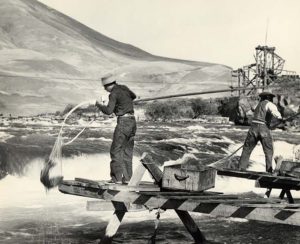A few years back, after listening to noontime chatter from the local Oregon PBS affiliate and a political scientist they keep on retainer, I emailed him this note. He’s quite good at what he does, but everything gets filtered through a political lens, naturally enough. It is after all, who he is.
The one I caught that day got under my skin. Judge James Redden has been a force here in the Northwest. The money made from the dams has built a juggernaut of an economic engine, mirrored by a powerful political machine that protects it. That engine was called to account by Redden for its management of the Columbia River System, management that had largely written off natural fish runs for the sake of power generation and the multi-millions of dollars it makes.
First some background and a few definitions. Anadromous fish populations go up rivers to breed, and out to the ocean to feed. Catadromous fish populations reverse that pattern. They go out to the ocean to breed and up the rivers to feed. Why that happens touches on a crucial point. It may sound counter-intuitive, but the temperate ocean and its up-welling nutrient flows, driven by currents and heat gradients, provides a much richer food base for migrating fish than the tropical ocean does.
Not surprisingly, tropical rivers are by contrast much richer than those in the temperate zone. That’s especially true here on the Northwest coast of North America. Those rivers usually emerge from mountain headwaters and streams that are quite barren. They have, after all, only recently come in from the cold. We’ve had friends who, after visiting the Oregon Coast, were sad to report how dirty the ocean was. They had to be reassured that the brown soup they’d seen was the stuff of legend – the legend of Pacific salmon that is.

Anadromy catapults the physics of the thing into pure magic. The fish are open living systems. They’re able to take and make enough energy to run against the tidal wash from the Second Law of Thermodynamics. They are “pockets of self-organization” delivering the riches of those ocean waters to streams badly in need of a little love.
Ecological science has gradually come to pervade mainstream thought and Redden’s opinions reflect that. That, and a little balance. The native peoples of this part of the world were never asked how they felt about losing their very identity, the ocean gift that was celebrated, eaten, bartered, stored, worshiped… a promise made good year after year. There was certainly no cost-benefit analysis done to find out how many billions of dollars would be lost forever to that native trade and from the loss of that nutrient re-distribution dynamism. Redress is the operative term here.

There are not many guarantees in this life, but the salmon and their anadromous brethren are certainly one of them. That alone makes them damn near invaluable.
